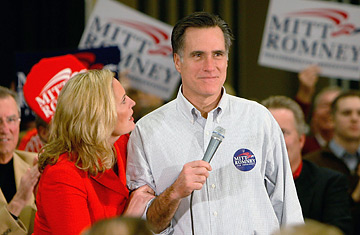
Republican candidate for president Mitt Romney campaigns in Florida.
From the day he announced his candidacy, observers have noted that Mitt Romney "looks presidential," yet this appearance advantage did not particularly help Romney in the early primary states. In Iowa and New Hampshire, states where voters expect — and usually receive — face time with every candidate, Romney came across on the stump as stilted and rehearsed. Voters flocked instead to the personality-rich and cash-poor campaigns of Mike Huckabee and John McCain.
"Sometimes he's so polished, he's polished almost to a flaw," said Brian Wood, 44, a real estate developer at a rally in Sarasota, Fla., expressing a common concern. "People don't think he's human."
The good news for Romney is that in the larger, more diverse state of Florida, most voters won't have a chance to make that up-close judgment. If Romney is able to surge past John McCain here in the state's primary on Jan. 29 — and most recent polls have McCain with a very slight lead — it will most likely be due to his ability to spend freely on expensive advertising throughout the state.
Throughout the primary season, Romney has been accused of trying — though often failing — to buy elections. But Florida is the first state money really can buy. "Romney is the only one [of the four major candidates] who has the money on hand to go on the air in our 10 major media markets," says Daniel Smith, a professor of political science at the University of Florida. "For everyone else, it's cost prohibitive to run a media campaign in Florida. It's completely different from New Hampshire, Iowa or Michigan."
As in every other state contest thus far, Romney is far outspending his Republican rivals on paid advertising. In Iowa he spent more than Huckabee by a ratio of 7 to 1, while in New Hampshire and South Carolina, he spent more than McCain by at least 5 to 1. And in the past month, one rival campaign estimates that Romney has spent twice the amount spent by any other candidate. He has also worked to gain an advantage in what consultants call "earned media" — the free, generally friendly local news coverage that a candidate generates by swinging through town. On that front, he's made high-profile visits to the state since 2005 — when he had an off-the-record meeting with then-Governor Jeb Bush, several of whose former staffers work for Romney today. Thursday evening's surprisingly civil G.O.P. debate played to his strengths as well: on camera, Romney came across as prepared, not scripted.
Florida may be a diverse state, but Romney makes much the same appeal to all Floridians; an unshakeable belief in reuniting the "Reagan coalition" of social, fiscal and foreign policy conservatives. Romney staffers seem confident that the governor can attract the social conservatives and evangelicals who have been supporting Huckabee — who has greatly reduced his presence here since his loss in South Carolina — along with a good chunk of the fiscal conservatives for whom Romney's private sector background has an almost mystical appeal.
His campaign's calculation about winning a large share of the state's evangelicals, however, may not be right. "What most people on the outside don't realize," says John Green, a fellow at the Pew Forum on Religion and Public Life who has studied evangelical voting patterns in Florida and elsewhere, "is that the evangelical electorate in Florida is actually pretty evenly divided between more conservative elements and more moderate camps." Green notes that Huckabee actually draws most of his support from that moderate wing. "It's likely that the group of people that might move away from Huckabee because he's not really campaigning there would probably move to John McCain" — whose views on the environment and human rights align more closely to their own. Still, Romney's membership in the LDS church, once thought to exclude the prospect of evangelicals' support, says Green, has been largely neutralized by the endorsements of such religious leaders as Bob Jones III.
Still, Romney advisers do have some basis for their optimism about Tuesday's race. The Florida G.O.P. primary is the first "closed" primary in the country; only registered Republicans can vote. McCain, while pulling a fair share of registered Republicans in other states, has been put over the top by independents. As national spokesman Kevin Madden puts it, "There is no refuge in the independent vote in Florida." But fortunately for Romney, there is some refuge from too much face-to-face, retail politics in the Sunshine State.
